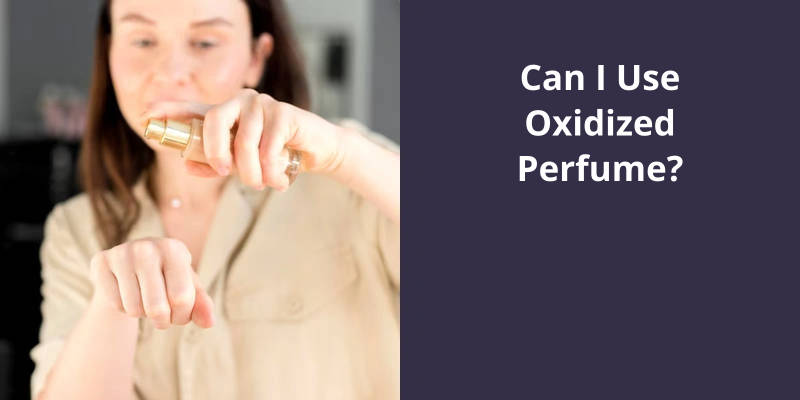Yes, you can use oxidized perfume, but the smell and quality of it will not be the same as when you first bought it. When a perfume oxidizes, it reacts with oxygen in the air and often heat or light, causing the fragrance to change. It doesn’t necessarily mean that it’s harmful to use, but the scent might not be as pleasant or as strong as it originally was. It strongly depends on personal preference whether you want to continue using it or not. It’s also worth noting that skin irritation could occur in some cases. If you notice any negative skin reactions, stop using the perfume immediately.

Is It Safe to Use Oxidized Perfume?
Using oxidized perfume isn’t recommended due to it’s potential risks. When a perfume becomes oxidized, it’s chemical composition may change, and this can lead to various issues when applied to the skin. One of the main concerns is the potential for skin irritations or allergic reactions. These reactions may range from mild irritation and redness to more severe allergic symptoms, such as itching, swelling, or even rashes. Therefore, it’s crucial to consider the risks before using any perfume that’s gone off.
When a perfume has gone off, it’s aromatic molecules may have deteriorated, decreasing it’s potency and reducing the overall performance. This means that the fragrance may not last as long as it should on the skin and might not project as strongly as intended.
The potential risks include skin irritations, allergic reactions, unpleasant smells, decreased performance, and wastage of a luxury product.
However, the process of oxidation can have a detrimental effect on the scent, causing it to change in composition and lose it’s original fragrance. Oxygen and light can alter the delicate balance of the perfume’s ingredients, resulting in a less desirable scent. It’s important for perfume enthusiasts to understand the oxidation process and take steps to prevent it from happening to their beloved fragrances.
What Does It Mean to Oxidize Perfume?
When perfume oxidizes, it undergoes chemical changes that can alter it’s scent and overall quality. The once vibrant and fresh notes may turn dull or even unpleasant. This oxidation process can also affect the stability of the perfume, potentially reducing it’s longevity and wear time.
Exposure to natural light, especially sunlight, can also contribute to the oxidation of perfume. UV rays can accelerate the breakdown of fragrance compounds, leading to changes in scent and color. The vibrant hues of the perfume may fade, and the fragrance itself may become weaker or take on an off-putting aroma.
It’s generally recommended to store perfumes in a cool, dark place to minimize the risk of oxidation. Keeping the perfume bottle tightly sealed and away from direct sunlight can help preserve it’s integrity. However, if you do notice that your perfume has oxidized, it may be best to avoid using it. The altered scent may not be as enjoyable as the original formulation, and the potential for skin irritation or allergic reactions may increase.
Lighter, citrus-based fragrances tend to degrade quicker compared to deeper, musky scents. This is because the fragrance compounds in lighter perfumes are more volatile and therefore more susceptible to oxidation.
This process can lead to alterations in scent, color, and overall quality.
How to Revive an Oxidized Perfume
- Remove the cap from the oxidized perfume bottle.
- Wipe the neck and threads of the bottle with a clean, dry cloth.
- Gently clean the spray nozzle using a cotton pad or swab soaked in rubbing alcohol.
- Shake the perfume bottle vigorously for a few seconds to mix the ingredients.
- Leave the perfume bottle uncapped for about 10-15 minutes to allow the alcohol to evaporate and freshen up the scent.
- Replace the cap tightly on the perfume bottle.
- Store the perfume bottle in a cool, dark place to prevent further oxidation.
- Perform a patch test on your skin before wearing the revived perfume to ensure that it hasn’t become too unpleasant.
- If the scent is still undesirable, consider blending it with another perfume to create a customized fragrance.
- Remember to properly maintain and store your perfumes to prevent oxidation in the future.
In especially humid or hot places, the natural oils and essences in your fragrance can start coagulating as they break down. This can lead to the oxidation or chemical degradation of the perfume. However, there’s a simple solution to prevent this from happening – storing your perfume in the fridge. The fridge maintains a stable temperature, keeping the perfume away from light and heat, making it the best way to avoid any potential damage or alteration to the fragrance.
How Do You Prevent Perfume Oxidation?
This can lead to changes in the scent and overall quality of the perfume. Oxidation occurs when the molecules in the fragrance react with oxygen, causing the scent to become altered. To prevent perfume oxidation, it’s important to store your fragrances in a cool, dark place.
Light and heat can break down the natural oils and essences in the perfume, leading to a change in it’s composition.
In hot and humid places, the risk of perfume oxidation is even higher. The high temperatures and humidity can cause the fragrance molecules to break down more rapidly, resulting in a change in scent and quality.
Furthermore, it’s important to keep the perfume bottles tightly sealed when not in use. This prevents air from entering the bottle and coming into contact with the fragrance, reducing the chances of oxidation. Make sure to close the cap or stopper securely after each use to maintain the freshness of the perfume.
Storing them in the fridge is an effective way to maintain a stable temperature and keep them away from light and heat. By implementing these practices, you can enjoy your favorite scents for a longer period of time.
Source: Yes, You Should Store Your Perfume Cold—Here’s Why
It’s important to keep an eye (or rather, a nose) on your perfume collection to ensure that they maintain their original quality. Certain signs like altered scents, hints of vinegar, or chemical notes can indicate that your perfume has gone bad. Let’s delve deeper into the factors that contribute to perfume expiration and how to prolong their shelf life.
How Do You Know a Perfume Has Gone Bad?
Perfume, like many other beauty products, has a shelf life. Over time, certain factors such as exposure to air, light, and temperature can cause the scent to undergo changes and eventually go bad. While some perfumes can last for several years without losing their original aroma, others may expire sooner, especially if they contain fats or oils.
One key indicator that your perfume has gone bad is a noticeable change in it’s scent. Perfumes are carefully crafted using a blend of various aromatic ingredients, and any alteration in their composition can result in a different smell. If you find that your once-beloved fragrance now smells completely different from when you first purchased it, this could be a sign that it’s spoiled.
Another telltale sign of an expired perfume is the development of unpleasant notes, such as hints of vinegar or other chemical-like odors. This can occur when certain components of the fragrance break down or react with air or other substances. Pay close attention to any strange or off-putting scents that emerge when you spray or apply the perfume.
This is because fats can undergo oxidation, which can significantly impact the quality and longevity of the scent.
Over time, perfume can undergo changes that are similar to those experienced by wine. While the most noticeable alteration typically occurs in the form of a change in color, the fragrance itself can also transform, presenting a slightly more bothersome situation for consumers.
Is It Normal for Perfume to Change Colour?
It isn’t uncommon for perfume to change color over time. This is due to a natural process called oxidation. Just like certain foods and beverages, perfume can react with air and light, causing it’s appearance to alter. These changes may range from a subtle shift in hue to a noticeable darkening of the liquid. While this can be worrisome for some perfume enthusiasts, it’s actually quite normal.
Oxidation occurs when the molecules in the perfume come into contact with oxygen molecules in the air. For example, a clear perfume may turn slightly yellow or amber, while a light pink perfume may become more rose-colored. These changes are purely cosmetic and don’t necessarily affect the quality or scent of the perfume.
However, it’s important to note that not all perfumes will undergo these color changes. Factors such as the specific chemical composition of the fragrance, the type of bottle it’s stored in, and the storage conditions can all influence the likelihood and extent of oxidation. Perfumes that contain a high concentration of natural ingredients, such as essential oils, are more prone to discoloration.
In some cases, a once vibrant and complex scent may become dull or sour. However, this isn’t always the case, and many perfumes maintain their original aroma even after years of storage.
If you notice significant changes in the color or scent of your perfume, it may be a sign that it’s gone bad. In general, it’s safe to use oxidized perfume as long as it still smells pleasant to you. However, if the scent has turned sour or unpleasant, it’s best to discard the perfume. Additionally, storing perfumes in a cool, dark place and tightly sealing the bottles can help slow down the oxidation process and prolong the lifespan of your fragrances.
Conclusion
In conclusion, it’s important to monitor the appearance of your perfume to detect any signs of oxidation. However, it’s crucial to consider the scent as well, as a bad odor accompanying the change in appearance suggests that it’s time to discard the perfume. By staying vigilant and recognizing these indicators, you can ensure that you’re using fresh and enjoyable fragrances without compromising their effectiveness or risking any unpleasant experiences.





